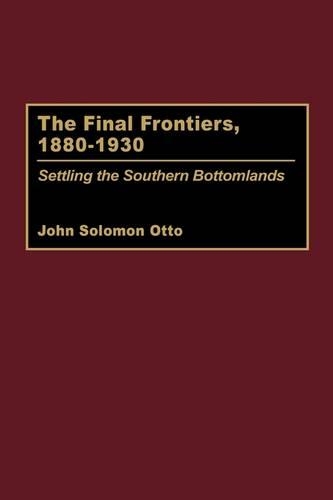
The Final Frontiers, 1880-1930: Settling the Southern Bottomlands
(Hardback)
Publishing Details
The Final Frontiers, 1880-1930: Settling the Southern Bottomlands
By (Author) John Otto
Bloomsbury Publishing PLC
Praeger Publishers Inc
30th September 1999
United States
Classifications
Tertiary Education
Non Fiction
Regional / International studies
976.041
Physical Properties
Hardback
208
Width 156mm, Height 235mm
482g
Description
An examination of the settlement history of the alluvial bottomlands of the lower Mississippi Valley from 1880 to 1930, this study details how cotton-growers transformed the swamplands of northwestern Mississippi, northeastern Louisiana, northeastern Arkansas, and southern Missouri into cotton fields. Although these alluvial bottomlands contained the richest cotton soils in the American South, cotton-growers in the Southern bottomlands faced a host of environmental problems, including dense forests, seasonal floods, water-logged soils, poor transportation, malarial fevers and insect pests. This interdisciplinary approach uses primary and secondary sources from the fields of history, geography, sociology, agronomy, and ecology to fill an important gap in our knowledge of American environmental history. Requiring laborers to clear and cultivate their lands, cotton-growers recruited black and white workers from the upland areas of the Southern states. Growers also supported the levee districts which built imposing embankments to hold the floodwaters in check. Canals and drainage ditches were constructed to drain the lands, and local railways and graveled railways soon ended the area's isolation. Finally, quinine and patent medicines would offer some relief from the malarial fevers that afflicted bottomland residents, and commercial poisons would combat the local pests that attacked the cotton plants, including the boll weevils which arrived in the early twentieth century.
Reviews
.,."a worthwhile addition to the literature on the recent South."-Journal of the American Studies Association of Texas
.,."provides an excellent overview of development in the bottomlands of the lower Mississippi valley between 1880 and 1930....will serve as a critical source of information for those interested in the southern bottomlands, , , , will particularly interest those who study the government's role in the development of railroads and drainage."-Journal of Southern History
.,."the book does...provide a readable story and an excellent handbook for students of American economic, environmental and social history."-Louisiana History
...a worthwhile addition to the literature on the recent South.-Journal of the American Studies Association of Texas
...provides an excellent overview of development in the bottomlands of the lower Mississippi valley between 1880 and 1930....will serve as a critical source of information for those interested in the southern bottomlands, , , , will particularly interest those who study the government's role in the development of railroads and drainage.-Journal of Southern History
...the book does...provide a readable story and an excellent handbook for students of American economic, environmental and social history.-Louisiana History
..."a worthwhile addition to the literature on the recent South."-Journal of the American Studies Association of Texas
..."the book does...provide a readable story and an excellent handbook for students of American economic, environmental and social history."-Louisiana History
..."provides an excellent overview of development in the bottomlands of the lower Mississippi valley between 1880 and 1930....will serve as a critical source of information for those interested in the southern bottomlands, , , , will particularly interest those who study the government's role in the development of railroads and drainage."-Journal of Southern History
Author Bio
JOHN SOLOMON OTTO is a Research Fellow with the International Center, Washington, D.C. He is the author of Southern Agriculture During the Civil War Era (Greenwood, 1994), The Southern Frontiers (1607-1860) (Greenwood, 1989,) Cannon's Point Plantation (1794-1860) (1984), and numerous essays in American History and Culture.
